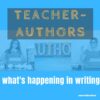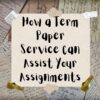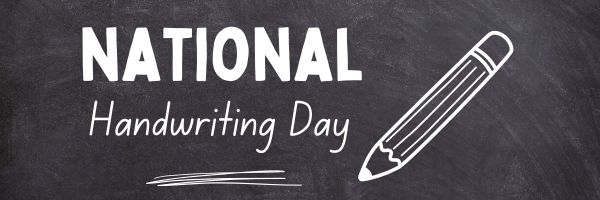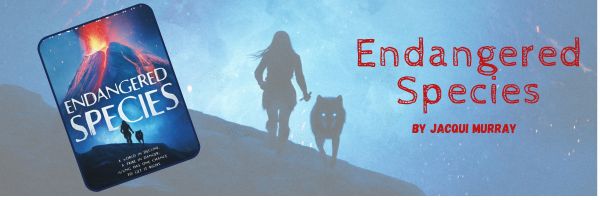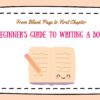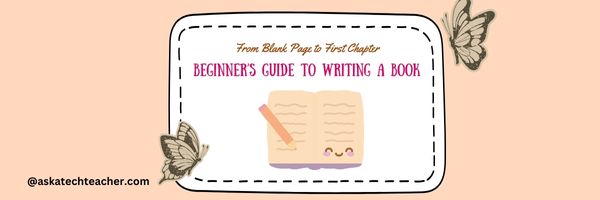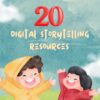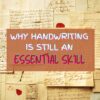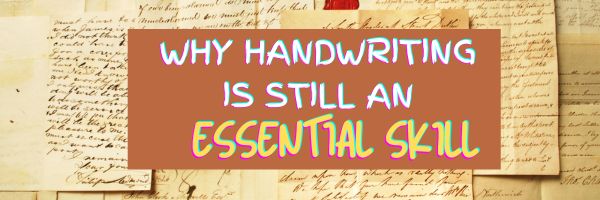Category: Writing
Teacher-Authors: What’s Happening on my Writer’s Blog
A lot of teacher-authors read my WordDreams blog. In this monthly column, I share the most popular post from the past month:
What Should You Know About Interactive Storytelling?
Here’s what I cover:
- What is it?
- How can writers use it?
- Advantages
- Disadvantages
What is interactive storytelling
Interactive storytelling is a growing trend that allows readers to actively participate in shaping the narrative. With advancements in augmented and virtual reality, stories are no longer confined to the pages of a book. Authors can provide immersive experiences and create narratives that respond to reader choices.
Interactive storytelling allows the audience to actively shape the story rather than passively consume it. Unlike traditional storytelling with a fixed plot, interactive stories let users influence the direction, outcomes, and details through their choices and input. It blends creativity with technology, making each telling unique. 81% of marketers agree interactive content grabs attention more effectively and 66% admit it increases audience engagement. I can attest to this popularity. As a teacher, I occasionally asked students to choose from among several story endings or create their own. A good example is Mission USA, a website that uses interactive storytelling to teach historic events such as the American Revolution, Civil Rights, the Great Depression, and more:

Students click into one of the stories and are asked to make decisions similar to those made during that time period and then experience the consequences of their choices–whether the Loyalists or Tories won, how a family survived (or didn’t) the Great Depression, or something else. Here’s a video to explain it:
[youtube https://www.youtube.com/watch?v=Kb_te-MmM04?si=v9ZG8x8n6TjCGMgk]
Another example many will remember is Oregon Trail where participants were expected to stock their Conestoga wagon to head to the Oregon territories (or California). Along the way, they made decisions such as whether to purchase mules vs. oxen, how to ford a river, how to cure diseases and injuries, and more. Their selections ultimately determined if they survived.
How can writers use interactive storytelling
Share this:
- Click to share on Facebook (Opens in new window) Facebook
- Click to share on X (Opens in new window) X
- Click to share on LinkedIn (Opens in new window) LinkedIn
- Click to share on Pinterest (Opens in new window) Pinterest
- Click to share on Telegram (Opens in new window) Telegram
- Click to email a link to a friend (Opens in new window) Email
- More
Why a Term Paper Writing Service Is the Best Way to Assist with Your Assignments
I know–many consider online services that write papers for you as a hard no, but let’s talk about that. Anecdotal data indicates 5-15% of students use these services, just don’t tell their teachers or parents. Why do they consider them useful rather than unacceptable? The Ask a Tech Teacher team came up with a list of reasons. Here me out. These aren’t good or bad, just reality. At the end of this article, you’ll feel good about giving both sides of this discussion a voice:
Why a Term Paper Writing Service Is the Best Way to Assist with Your Assignments
Some assignments are manageable—you knock them out in an hour, no stress. But term papers? They’re a whole different thing. They take time, require proper research, and somehow always seem to be due right when everything else is piling up. That’s why students look for ways to make the process easier, and one of the smartest moves is using a term paper writing service. Not to avoid the work, but to actually get through it without losing sleep, missing deadlines, or turning in something rushed and half-baked.
The Real Term Paper Writing Service Benefits
A lot of people assume that using a writing service means skipping the learning process, but that’s not really how it works. The biggest term paper writing service benefits come from having a solid reference—something well-researched, properly formatted, and structured the way a professor actually wants. For example, an economics essay writing service can provide you with a clear and comprehensive paper that not only saves you time but also helps you understand complex concepts. By reviewing a well-written economics essay, you can improve your grasp of the subject and learn the proper way to approach similar topics in the future.
Here’s why that matters:
- Time management – Instead of spending hours trying to figure out where to start, students get a structured example that makes writing faster.
- Better understanding of the topic – A well-written paper can show how to break down complex ideas in a way that makes sense.
- Avoiding last-minute panic – Nobody writes their best work at 3 AM the night before it’s due. Having a professional example saves that stress.
A term paper isn’t just about filling pages—it’s about presenting ideas in a clear, logical way. Seeing how that’s done makes a huge difference in how students approach their own writing.
Getting Assistance with Assignments Through Writing Services
Every student has hit that moment where they stare at a blank screen, unsure where to even begin. That’s where getting assistance with assignments through writing services comes in. It’s not about handing off the work—it’s about having a starting point that actually makes sense. A dissertation writing service from KingEssays can provide that crucial foundation, offering a structured outline and well-researched content to get you started on the right track. With their expert guidance, you’ll have a clear direction to help you complete your dissertation with confidence.
Think about it: would you rather piece together an argument from scratch, hoping it works, or have a structured paper that lays out key points, sources, and ideas in a way that you can build on? Even the best writers don’t start from nothing. They outline, they revise, they look at examples of strong arguments. Having professional help doesn’t replace learning—it improves it.
Why Use Term Paper Writing Service?
Some students assume they should power through everything alone because that’s what “real” students do. But professors have research assistants, authors have editors, even scientists work in teams—so why is it wrong for students to get help?
The real question isn’t why use a term paper writing service? but rather why struggle unnecessarily when you have options? College is supposed to be about learning, not just suffering through deadlines with no support. A term paper writing service helps students:
- Avoid common mistakes – Citation errors, weak arguments, and structural issues are all easier to fix when you have a good example to follow.
- See how professional research is done – Most students aren’t trained researchers. Seeing a properly cited, well-supported paper makes a huge difference.
- Learn faster – Reading well-written academic work teaches students how to structure their own ideas more effectively.
Getting help doesn’t mean not doing the work. It means doing it better.
The Best Way to Get Assignment Help
Not all writing services are the same. Some are overpriced, some deliver rushed work, and some don’t really care whether the writing actually meets academic standards. Finding the best way to get assignment help means knowing what to look for.
Here’s what makes a term paper writing service actually useful:
- Writers with real academic experience – A paper on economics should be written by someone who actually understands economics.
- Custom work, not generic templates – Recycled essays don’t help students learn. A solid service provides fresh, original writing.
- Clear structure and formatting – Knowing how to format a paper correctly is half the battle. A good service provides that framework.
It’s not about just getting an assignment done—it’s about getting it done right.
The Value of Professional Term Paper Writing Assistance
Some students worry that getting professional help means they’re relying too much on outside sources. But that’s what education is—learning from experts. Professional term paper writing assistance isn’t about replacing effort; it’s about making sure that effort is actually productive.
A well-written term paper isn’t just another grade. It’s practice for the kind of research, analysis, and writing that students will use in their careers. Whether someone goes into business, science, law, or even creative work, strong writing matters. Having the right tools to build those skills is what makes a difference.
The Bottom Line
Nobody gets through college without some kind of help. Professors guide students, tutors explain difficult concepts, and study groups share ideas. A term paper writing service is just another form of support—one that makes sure students aren’t just surviving assignments but actually improving their writing, research, and critical thinking skills along the way.
Here’s the sign-up link if the image above doesn’t work:
https://forms.aweber.com/form/07/1910174607.htm
“The content presented in this blog are the result of creative imagination and not intended for use, reproduction, or incorporation into any artificial intelligence training or machine learning systems without prior written consent from the author.”
Jacqui Murray has been teaching K-18 technology for 30 years. She is the editor/author of over a hundred tech ed resources including a K-12 technology curriculum, K-8 keyboard curriculum, K-8 Digital Citizenship curriculum. She is an adjunct professor in tech ed, Master Teacher, freelance journalist on tech ed topics, and author of the tech thrillers, To Hunt a Sub and Twenty-four Days. You can find her resources at Structured Learning.
Share this:
- Click to share on Facebook (Opens in new window) Facebook
- Click to share on X (Opens in new window) X
- Click to share on LinkedIn (Opens in new window) LinkedIn
- Click to share on Pinterest (Opens in new window) Pinterest
- Click to share on Telegram (Opens in new window) Telegram
- Click to email a link to a friend (Opens in new window) Email
- More
National Handwriting Day
National Handwriting Day is celebrated on January 23rd each year. It is a day dedicated to promoting the importance of handwriting and encouraging people to embrace the art of writing by hand. This day was established to honor the birthday of John Hancock, one of the Founding Fathers of the United States, known for his prominent and stylish signature on the Declaration of Independence. Handwriting is considered a personal and unique form of expression, and National Handwriting Day aims to celebrate and preserve this traditional skill.
Articles on handwriting from Ask a Tech Teacher:
Check these out:
Is Handwriting So Last Generation
Is Handwriting So Last Generation–Redux
How to Create a Handwriting Workbook to Help Improve Penmanship
Handwriting vs. Keyboarding–from a Student’s Perspective
When is Typing Faster Than Handwriting? (more…)
Share this:
- Click to share on Facebook (Opens in new window) Facebook
- Click to share on X (Opens in new window) X
- Click to share on LinkedIn (Opens in new window) LinkedIn
- Click to share on Pinterest (Opens in new window) Pinterest
- Click to share on Telegram (Opens in new window) Telegram
- Click to email a link to a friend (Opens in new window) Email
- More
How to use Digital Quick Writes–the video
How to use Digital Quick Writes
This video is from a series I taught for school districts. It is now available for free, here on Ask a Tech Teacher:
–summarized by NoteGPT
Summary
In this video, Jacqui Murray discusses the concept of “quick writes” as a dynamic and engaging way to teach writing in the classroom. Quick writes are short, spontaneous writing exercises that allow students to express their thoughts and ideas without the pressure of formal writing tasks. Murray emphasizes the importance of variety and choice in writing activities, which can cater to students’ different preferences and skills. By integrating technology and allowing students to use a range of mediums—such as audio, visual, and written forms—quick writes not only reinforce writing skills but also enhance problem-solving, creative thinking, and communication abilities. The video outlines practical strategies for implementing quick writes in the classroom, provides examples of tools and techniques, and highlights how these exercises can meet Common Core standards. Overall, Murray advocates for a process-oriented approach to writing, focusing on student engagement and skill development rather than the final product.
Highlights
- ✍️ Dynamic Writing Experience: Quick writes offer an engaging alternative to traditional writing assignments, allowing students to express themselves freely.
- 🌍 Integration of Technology: Incorporating various digital tools enhances the writing experience and fosters creativity among students.
- 🎨 Variety of Mediums: Students can choose from multiple formats—writing, drawing, audio—to communicate their ideas effectively.
- 🕒 Short and Focused: Quick writes typically last 10-15 minutes, encouraging concise and thoughtful expression of ideas.
- 📢 Process Over Product: The focus is on the writing process and student effort rather than the final outcome, promoting a growth mindset.
- 📚 Alignment with Common Core: Quick writes can be tailored to meet various educational standards, making them versatile across subjects.
- 🤝 Collaborative Learning: Sharing and discussing quick writes with peers enhances understanding and communication skills.
Key Insights
- 📅 Flexibility in Timing: Quick writes can be integrated into any part of a lesson, making them adaptable to various subjects and topics. This flexibility allows teachers to connect writing with ongoing projects or discussions, reinforcing the relevance of writing in different contexts.
- 💡 Choice Empowers Students: By providing students with options for how they want to express their ideas—be it through writing, drawing, or using multimedia—teachers can cater to diverse learning styles. This choice not only fosters engagement but also encourages students to take ownership of their learning process.
- 🛠️ Technological Proficiency: Incorporating digital tools and platforms into quick writes helps students become more comfortable with technology. This not only prepares them for future academic challenges but also equips them with essential skills for the modern workforce.
- 🎯 Focus on Skill Development: Quick writes emphasize the importance of developing writing skills through practice rather than perfection. By creating a low-stakes environment where effort and process are prioritized, students are more likely to take risks and experiment with their writing.
- 🤔 Critical Thinking and Problem Solving: Engaging in quick writes requires students to think critically and solve problems quickly, especially when using new technologies or formats. This process aligns with educational standards that emphasize critical thinking as a vital skill for success.
- 📝 Assessment for Learning: Instead of grading the final product, teachers assess students based on their effort and engagement during quick writes. This formative assessment approach allows for ongoing feedback and supports a learning environment focused on growth rather than competition.
- 🎉 Fun and Engagement: Quick writes can be a fun way to break up traditional lessons, making writing enjoyable for students who may otherwise find it daunting. By incorporating games and creative formats, teachers can foster a love for writing that extends beyond the classroom.
Conclusion
Jacqui Murray’s discussion on quick writes highlights the importance of innovative and flexible writing practices in education. By integrating technology, allowing for student choice, and emphasizing the writing process, educators can create a more engaging and effective writing experience. Quick writes serve as a powerful tool to develop not only writing skills but also critical thinking, problem-solving, and collaboration—all of which are essential for students in today’s world. Through this approach, teachers can foster a classroom environment that values creativity, encourages exploration, and supports skill development for all learners.
Share this:
- Click to share on Facebook (Opens in new window) Facebook
- Click to share on X (Opens in new window) X
- Click to share on LinkedIn (Opens in new window) LinkedIn
- Click to share on Pinterest (Opens in new window) Pinterest
- Click to share on Telegram (Opens in new window) Telegram
- Click to email a link to a friend (Opens in new window) Email
- More
Teacher-Authors–#BookBlast for my latest Prehistoric Fiction
This post has little to to with technology in the classroom but a lot to do with the launch of my latest prehistoric fiction, Endangered Species, Book 1 of the trilogy, Savage Land. Join the Blog Hop over at my writer’s blog, WordDreams!
Curious? Not sure you want to invest your time yet? Here’s the trailer:
Alright! Here’s what’s going on:

I’ll be visiting writer friend blogs January 6-26, 2025, and then continue with the occasional “I’m Traveling” visits throughout 2025. We’ll chat about Neanderthals, early man, Endangered Species, and writing in general. Here are articles you can read in alphabetic order: (more…)
Share this:
- Click to share on Facebook (Opens in new window) Facebook
- Click to share on X (Opens in new window) X
- Click to share on LinkedIn (Opens in new window) LinkedIn
- Click to share on Pinterest (Opens in new window) Pinterest
- Click to share on Telegram (Opens in new window) Telegram
- Click to email a link to a friend (Opens in new window) Email
- More
From Blank Page to First Chapter: A Beginner’s Guide on How to Start Writing a Book
Ask a Tech Teacher is officially on Thanksgiving break so I’m going to pop in here with two posts from our international team that just couldn’t wait:
-
From Blank Page to First Chapter: A Beginner’s Guide on How to Start Writing a Book-–for the teacher-authors following Ask a Tech Teacher, a how-to primer on writing the book that rattles around in your head (see below)
- Top 5 Game Development Platforms for Young Coders: Building Skills with Fun–perfect for those still doing Hour of Code in December (click here after 11-26-24)
From Blank Page to First Chapter: A Beginner’s Guide on How to Start Writing a Book
The truth is, many of us dream about writing a book, but we stop ourselves because we think we lack experience or don’t know where to start. Here’s the secret: no one starts as an expert. Whether you’re an educator hoping to inspire others, a student exploring creativity, or simply someone with a tale to tell, this guide is here to show you that the hardest part—getting started—isn’t as scary as it seems.
We’ll break it down into small, achievable steps, from brainstorming ideas to turning them into something tangible. Ready to take that first leap? Let’s begin your journey to becoming a writer.
[caption id="attachment_70524" align="aligncenter" width="300"] Photo by Glen Noble on Unsplash[/caption]
Photo by Glen Noble on Unsplash[/caption]
Embrace Your Inner Storyteller
Think about what sparks your desire to write. Are you an educator who wants to turn classroom experiences into a guide for others? A parent with stories to inspire your kids? Whatever your reason, it’s valid—and it’s the fuel that will keep you going.
Identify your audience
Are you writing for fellow teachers? Students? A general audience? For example, if you’re writing for educators, your book might blend personal anecdotes with actionable tips. Writing for students? Maybe you’ll create relatable stories that inspire them to dream big. Your audience shapes the tone, structure, and even the language of your book.
Find your voice
Don’t worry about sounding “perfect” or “writerly.” Instead, focus on authenticity. Are you humorous, empathetic, or straight-to-the-point? Let that shine through—your readers will thank you for it.
The Idea Phase—Where Do Stories Come From?
Inspiration doesn’t have to be dramatic. It might be something simple, like a funny interaction with a student, a challenge you overcame, or a lesson that stuck with you. Even mundane experiences can become meaningful when viewed through the right lens. The key is to turn your raw inspiration into a clear, actionable theme. If you’re more of a visual thinker, try mind mapping—grab a piece of paper, write your main idea in the center, and branch out with related thoughts.
[caption id="attachment_70525" align="aligncenter" width="300"] Photo by Debby Hudson on Unsplash[/caption]
Photo by Debby Hudson on Unsplash[/caption]
Crafting Your Blueprint
Before writing, take some time to sketch out the structure of your book. Think of chapters, key points, and takeaways for your readers. If outlining feels overwhelming, start with a simple method.
For example, if your book is about engaging students in creative ways, your outline might include chapters like Understanding Student Motivation and Practical Classroom Strategies. Over time, you can add details and expand on these topics.
Technology makes outlining a breeze. Apps like Scrivener or Plottr allow you to visualize your book’s structure, rearrange sections easily, and even track your progress. If you prefer pen and paper, sticky notes on a wall can give you a physical view of your chapters, which is especially helpful when tackling how to start writing a book.
Writing Without Fear
Once your outline is ready, it’s time to do what you’ve been waiting for—start writing. For many beginners asking how to start writing a book with no experience, this step feels the most intimidating. But remember, no one writes a perfect first draft. The goal is progress, not perfection.
Fear is often the biggest obstacle to writing books. Many first-time writers worry about things like “What if it’s not good enough?” Here’s the truth: every writer, even bestselling authors, has faced these fears. The trick is to silence that inner critic during the first draft. Focus on writing one paragraph or one scene at a time. You’re not writing the whole book today—just a tiny piece of it.
Write first, edit later
Your first draft is your playground. Don’t get stuck trying to make every sentence perfect. Just let the words flow. Editing comes later, and it’s a separate skill from writing. When you finish your first draft, you can revise it with fresh eyes.
Many writers seek assistance, wondering, “Can someone write my paper or help me refine my ideas?” There are plenty of resources, like writing communities or freelance editors, to guide you through this phase.
For on-the-go inspiration, try dictation apps that turn your spoken words into text. If staying focused is a struggle, apps like FocusWriter or Freedom can help eliminate distractions.
Building Confidence Through Feedback
Seeking feedback from trusted sources is one of the best ways to grow as a writer and refine your work. Many new writers hesitate to share their drafts, fearing criticism. But early feedback is invaluable.
Share chapters or excerpts with close friends, colleagues, or even online writing groups. These fresh perspectives can catch blind spots and encourage. Platforms like Scribophile or NaNoWriMo forums connect you with others on the same journey, offering support, critiques, and tips.
Bringing Your Book to Life
Editing is a crucial step in writing. Start with self-editing. Next, consider professional editing services if your budget allows—many platforms specialize in affordable services for beginners.
For beginners wondering how to start writing a book and sharing it with the world, self-publishing platforms like Amazon Kindle Direct Publishing (KDP) or IngramSpark are fantastic options. They allow you to retain creative control and reach global audiences. If traditional publishing is your goal, research literary agents and publishers that align with your book’s theme.
Final Thoughts
Writing a book isn’t just about the final product—it’s about the journey. It’s about discovering your voice, sharing your unique perspective, and creating something that could inspire, educate, or entertain others. Whether you’re starting with a spark of an idea or still figuring out how to start writing a book with no experience, remember that every writer begins somewhere.
Take it one step at a time. Embrace the messy drafts, seek feedback, and use the tools and strategies available to you. Writing books isn’t reserved for seasoned authors—it’s for anyone with a story or an idea worth sharing.
Your story is important. So start today, even if it’s just a sentence or a rough outline. Who knows? That small step could lead to something extraordinary. You’ve got this—now go write your book.
Here’s the sign-up link if the image above doesn’t work:
https://forms.aweber.com/form/07/1910174607.htm
“The content presented in this blog are the result of creative imagination and not intended for use, reproduction, or incorporation into any artificial intelligence training or machine learning systems without prior written consent from the author.”
Jacqui Murray has been teaching K-18 technology for 30 years. She is the editor/author of over a hundred tech ed resources including a K-12 technology curriculum, K-8 keyboard curriculum, K-8 Digital Citizenship curriculum. She is an adjunct professor in tech ed, Master Teacher, freelance journalist on tech ed topics, and author of the tech thrillers, To Hunt a Sub and Twenty-four Days. You can find her resources at Structured Learning.
Share this:
- Click to share on Facebook (Opens in new window) Facebook
- Click to share on X (Opens in new window) X
- Click to share on LinkedIn (Opens in new window) LinkedIn
- Click to share on Pinterest (Opens in new window) Pinterest
- Click to share on Telegram (Opens in new window) Telegram
- Click to email a link to a friend (Opens in new window) Email
- More
#20: A Holiday Card in a Drawing Program (like KidPix)
Create a holiday card for Thanksgiving or Christmas in KidPix or another drawing program and reinforce early writing skills while teaching mouse skills, toolbars and tool use: (more…)
Share this:
- Click to share on Facebook (Opens in new window) Facebook
- Click to share on X (Opens in new window) X
- Click to share on LinkedIn (Opens in new window) LinkedIn
- Click to share on Pinterest (Opens in new window) Pinterest
- Click to share on Telegram (Opens in new window) Telegram
- Click to email a link to a friend (Opens in new window) Email
- More
20 Online Resources About Digital Storytelling
Digital storytelling is a modern form of storytelling that uses digital tools and multimedia elements to craft and convey narratives. It blends traditional storytelling with digital technologies, allowing stories to be told through various digital formats, including videos, podcasts, blogs, social media, interactive websites, and multimedia presentations.
Here are popular online resources to teach about digital storytelling (click here for updates to list):
- Adobe Creative Cloud Express–digital stories that blend images and audio into a video
- Adobe Voice–Show your story; free
- Bluster–word matching game develops vocabulary and word understanding for school-aged children (app)
- Book Creator
- Book Writer--write books on an iPad; view in iBooks (fee) (app)
- Comic Book!(app)
- Create a story
- Draw a Stickman–draw the main character of your story; the site turns it into a choose-your-own-adventure story, asking you to add detail. (app)
- Newspapers, posters, comics—learn to create
- Pixton–use their storytelling layout (picture at top, text at bottom)
- Puppet Pals – Create simple animated stories with puppets and even yourself!
- Shutterfly Photostory–self-published student books (app)
- StoryBird—-storytelling with art–beautiful
- Storyboard That–use their storytelling layout (picture at top, text at bottom)
- StoryJumper–build a book
- Sutori–use a variety of multimedia; fee/free accounts
- VoiceThread (app)
- Write About This–writing prompts for students (app)
Lesson Plans
Here’s the sign-up link if the image above doesn’t work:
https://forms.aweber.com/form/07/1910174607.htm
“The content presented in this blog are the result of creative imagination and not intended for use, reproduction, or incorporation into any artificial intelligence training or machine learning systems without prior written consent from the author.”
Jacqui Murray has been teaching K-18 technology for 30 years. She is the editor/author of over a hundred tech ed resources including a K-12 technology curriculum, K-8 keyboard curriculum, K-8 Digital Citizenship curriculum. She is an adjunct professor in tech ed, Master Teacher, webmaster for four blogs, freelance journalist on tech ed topics, contributor to NEA Today, and author of the tech thrillers, To Hunt a Sub and Twenty-four Days. You can find her resources at Structured Learning.
Share this:
- Click to share on Facebook (Opens in new window) Facebook
- Click to share on X (Opens in new window) X
- Click to share on LinkedIn (Opens in new window) LinkedIn
- Click to share on Pinterest (Opens in new window) Pinterest
- Click to share on Telegram (Opens in new window) Telegram
- Click to email a link to a friend (Opens in new window) Email
- More
Top Tips And Tricks To Make Your Assignment Look Professional
How do assignments made by online professionals get good scores? Here are tips to make your assignment look professional, from the Ask a Tech Teacher international team:
Top Tips And Tricks To Make Your Assignment Look Professional
Introduction
One of the most important aspects of an assignment is how you present your report. Similarly, when it comes to the art of assignment creation, it is not just about the content. It is also about how you present it to your professor.
A meticulously designed has the best assignment front page design, an executive summary, a table of contents, and its overall design and presentation.
Moreover, creating the best cover page design for assignments sets the tone for what’s to come next. This signals the readers that they are about to engage with something that will be interesting to read.
This article will emphasize the tips and tricks that will make your assignment look professional.
Are you stressed due to low academic scores and want to improve your grades?
Well, worry no more! Let these tips help you. (more…)
Share this:
- Click to share on Facebook (Opens in new window) Facebook
- Click to share on X (Opens in new window) X
- Click to share on LinkedIn (Opens in new window) LinkedIn
- Click to share on Pinterest (Opens in new window) Pinterest
- Click to share on Telegram (Opens in new window) Telegram
- Click to email a link to a friend (Opens in new window) Email
- More
The Case for Why Handwriting is Still an Essential Skill for Students
- Enhanced memory and learning: Handwriting improves retention of information compared to typing.
- Improved hand-eye coordination and fine motor skills, essential for cognitive development .
- Enhanced creativity and critical thinking: The slower pace of handwriting allows for more time to think and formulate ideas, fostering creativity and critical thinking.
- Better reading fluency and comprehension skill
- Improved spelling, grammar, and composition, which are crucial for academic success and test performance.
Read the Full Story: National Public Radio (5/11) (more…)
Share this:
- Click to share on Facebook (Opens in new window) Facebook
- Click to share on X (Opens in new window) X
- Click to share on LinkedIn (Opens in new window) LinkedIn
- Click to share on Pinterest (Opens in new window) Pinterest
- Click to share on Telegram (Opens in new window) Telegram
- Click to email a link to a friend (Opens in new window) Email
- More

